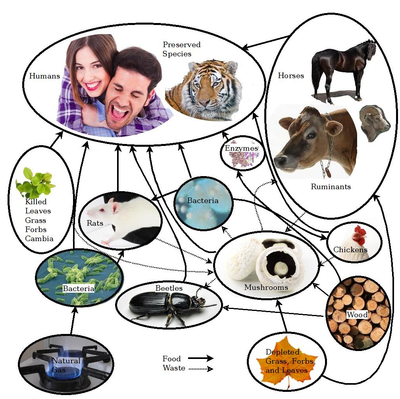Mass human starvation is currently likely if global agricultural production is dramatically reduced for several years following a global catastrophe: e.g. super volcanic eruption, asteroid or comet impact, nuclear winter, abrupt climate change, super weed, extirpating crop pathogen, super bacterium, or super crop pest. This study summarizes the severity and probabilities of such scenarios, and provides an order of magnitude technical analysis comparing caloric requirements of all humans for five years with conversion of existing vegetation and fossil fuels to edible food. Here we present mechanisms for global-scale conversion including: natural gas-digesting bacteria, extracting food from leaves, and conversion of fiber by enzymes, mushroom or bacteria growth, or a two-step process involving partial decomposition of fiber by fungi and/or bacteria and feeding them to animals such as beetles, ruminants (cattle, sheep, etc), rats and chickens. We perform an analysis to determine the ramp rates for each option and the results show that careful planning and global cooperation could maintain humanity and the bulk of biodiversity.
Keywords
Risk; Moral hazard; Chemosynthetic bacteria; Fishing; Extinction; Cellulosic biofuels
See also

- Feeding Everyone No Matter What - The full book main page
- David Denkenberger and Joshua Pearce, Feeding Everyone No Matter What: Managing Food Security After Global Catastrophe , 1st Edition, Academic Press, 2015
- Free Preview: Google books
- Cover on Academia
- Facebook page
- Alternative Foods as a Solution to Global Food Supply Catastrophes
- Resilience to global food supply catastrophes
- Feeding Everyone if the Sun is Obscured and Industry is Disabled
- Cost-Effectiveness of Interventions for Alternate Food to Address Agricultural Catastrophes Globally
- Feeding Everyone: Solving the Food Crisis in Event of Global Catastrophes that Kill Crops or Obscure the Sun
- Food without sun: Price and life-saving potential
- Cost-effectiveness of interventions for alternate food in the United States to address agricultural catastrophes
- Micronutrient Availability in Alternative Foods During Agricultural Catastrophes
- Preliminary Automated Determination of Edibility of Alternative Foods: Non-Targeted Screening for Toxins in Red Maple Leaf Concentrate
- Open Source Software Toolchain for Automated Non-Targeted Screening for Toxins in Alternative Foods
- Scaling of greenhouse crop production in low sunlight scenarios
- Potential of microbial protein from hydrogen for preventing mass starvation in catastrophic scenarios
- U.S. Potential of Sustainable Backyard Distributed Animal and Plant Protein Production During & After Pandemics
- Global distribution of forest classes and leaf biomass for use as alternative foods to minimize malnutrition
- Long-term cost-effectiveness of interventions for loss of electricity/industry compared to artificial general intelligence safety
- Long term cost-effectiveness of resilient foods for global catastrophes compared to artificial general intelligence safety
- Rapid repurposing of pulp and paper mills, biorefineries, and breweries for lignocellulosic sugar production in global food catastrophes
- Nutrition in Abrupt Sunlight Reduction Scenarios: Envisioning Feasible Balanced Diets on Resilient Foods
- Methane Single Cell Protein: securing protein supply during global food catastrophes
- Killing two birds with one stone: chemical and biological upcycling of polyethylene terephthalate plastics into food
- How Easy is it to Feed Everyone? Economic Alternatives to Eliminate Human Nutrition Deficits
- Quantifying Alternative Food Potential of Agricultural Residue in Rural Communities of Sub-Saharan Africa
- Yield and Toxin Analysis of Leaf Protein Concentrate from Common North American Coniferous Trees
- Toxic Analysis of Leaf Protein Concentrate Regarding Common Agricultural Residues
- Towards Sustainable Protein Sources: The Thermal and Rheological Properties of Alternative Proteins
Additional Information
- ALLFED
- Dave Denkenberger Publications
- OSE Wiki "Synfood" (i.e. protein and other dietary components from microbial organisms fed on gas or other hydrocarbons)






